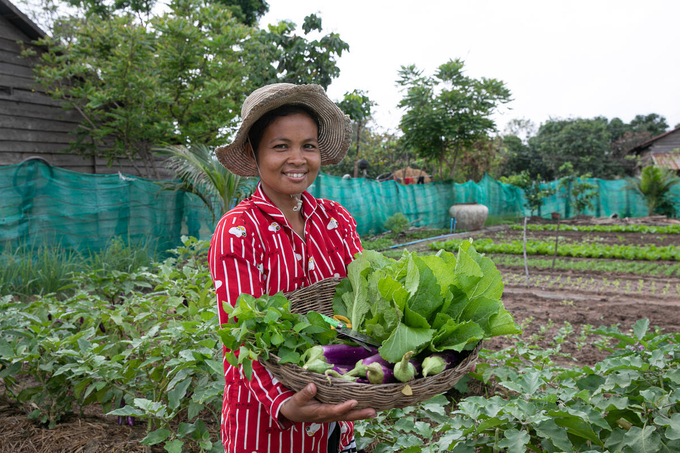May 21, 2025 | 05:16 GMT +7
May 21, 2025 | 05:16 GMT +7
Hotline: 0913.378.918
May 21, 2025 | 05:16 GMT +7
Hotline: 0913.378.918

A woman farmer with a basket of harvested vegetables.
The Food and Agriculture Organization of the United Nations (FAO) welcomes the resolution adopted today by the United Nations (UN) General Assembly to declare 2026 as International Year of the Woman Farmer.
The resolution, which was proposed by the United States of America and adopted by consensus, invites FAO, in collaboration with the other UN Rome-based Agencies, to facilitate the implementation and observance of the International Year of the Woman Farmer.
It also invites UN Member States, organizations of the United Nations System, other international organizations and stakeholders, including civil society, private sector and academia, to increase awareness of the crucial role that women farmers around the world play in agrifood systems, as well as their contributions to food security, nutrition and poverty eradication.
In this regard, the International Year of the Woman Farmer 2026 will serve as a platform for the adoption of effective policies and actions against the barriers and challenges that women farmers face across agrifood systems, as well as to promote gender equality and the empowerment of all women in agriculture.
The observance will also highlight the vital role of peasant women and other rural women in ensuring the economic survival of their families and contributing to both the rural and national economies.
Women in agrifood systems and the challenges they face
FAO’s recent report, The Status of Women in Agrifood Systems, offers comprehensive insights into gender dynamics across agrifood systems. It emphasizes women's participation in socio-economic opportunities and calls on all actors to close significant gaps in women’s productivity and wages, and work to empower women working in agrifood systems.
It also reaffirms FAO's commitment to deepen its focus on gender equality and women’s empowerment, which includes advocating for policy frameworks that seek to address social norms and structural constraints and utilizing gender-transformative approaches to a greater extent in our projects and programming for inclusive rural development.
The report finds that despite comprising 39% percent of the global agricultural labor force, women encounter significant discrimination, confronting challenges in land and livestock ownership, access to quality and secure jobs, equitable pay, participation in decision-making processes, and accessing credit and financial services.
It calls for global commitment to address these entrenched disparities to enhance food security, drive economic prosperity, and advance gender equality within agrifood systems.
Moreover, another recent FAO report, The Unjust Climate, presents a comprehensive analysis of the impacts of climate change on rural populations, with a particular focus on vulnerable groups such as women, youth, and individuals living in poverty.
Drawing on data from 24 countries across five world regions, the report integrates socioeconomic indicators with georeferenced climate data, providing insights into how climate stressors affect incomes, labor allocations, and adaptive strategies. It finds for example that a 1° C increase in long-term average temperatures is associated with a 34 percent reduction in the total incomes of female-headed households, relative to those of male-headed households.
In commemorating the International Year of the Woman Farmer in 2026, FAO acknowledges the pivotal role of rural women in global agrifood systems and commits to addressing the challenges they face. Through concerted efforts and collaboration among Member States, UN entities, civil society, academia, the private sector, Indigenous Peoples, local communities, individuals and other actors, the Year will strive to raise awareness, implement concrete actions, and pave the way for more efficient, inclusive, resilient, and sustainable agrifood systems.
(FAO)

(VAN) Attempts to bring down the price of the Japanese staple have had little effect amid a cost-of-living crisis.

(VAN) Fourth most important food crop in peril as Latin America and Caribbean suffer from slow-onset climate disaster.

(VAN) Shifting market dynamics and the noise around new legislation has propelled Trouw Nutrition’s research around early life nutrition in poultry. Today, it continues to be a key area of research.

(VAN) India is concerned about its food security and the livelihoods of its farmers if more US food imports are allowed.

(VAN) FAO's Director-General emphasises the need to work together to transform agrifood systems.

(VAN) Europe is facing its worst outbreak of foot-and-mouth since the start of the century.

(VAN) The central authorities, in early April, released a 10-year plan for rural vitalization.